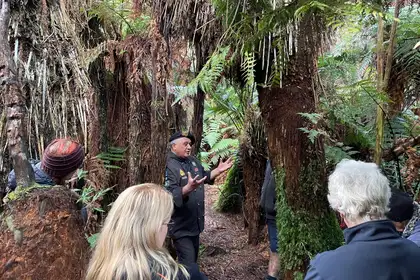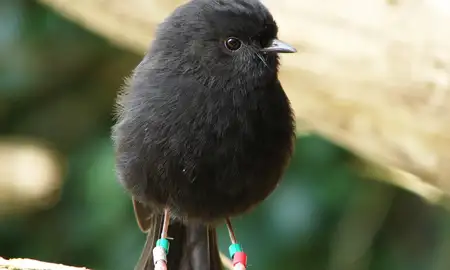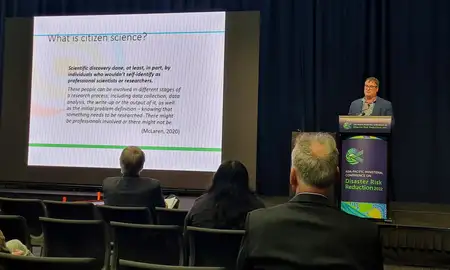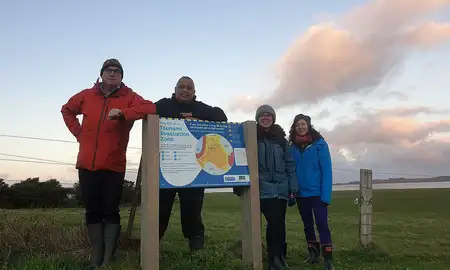
Chef Joe McLeod talking about indigenous plants during the Walk and Forage in the Kopi Bush. There were 13 participants, including Dr Susie Meade (Office of the Prime Minister's Chief Science Advisor), Massey’s Dr Katherine Holt and locals.
Held from 15 – 20 August, the annual Festival was the third of its kind and a first for lead organiser Alicia Cui, Research Officer at Massey’s Joint Centre for Disaster Research (JCDR) focusing on science communication and marketing.
Ms Cue says they wanted this year’s Festival to focus on the local community and their day-to-day interests.
“Chatham Island has fishers and farmers, so as outsiders we wanted to select topics relevant to them and to engage with them in a genuine way. It worked well. We had a lot of local participation in our talks.”
The Festival of Science was the brainchild of Professor David Johnston, science historian and Director of the JCDR, together with Rēkohu/Wharekauri/Chatham Islands Tourism Manager Jackie Gurden and Jocelyn Powell, museum curator and retired research botanist.
“The idea was to share knowledge about the Chatham Islands because they are such a special place, particularly for scientists in the environmental field,” Ms Cui says.
“Not only is there the volcanic landscape, but the Chatham Islands are also home to a lot of rare endemic flora, fauna and birds.”
August is traditionally a slow time for tourism, so the Festival was also a way of attracting visitors – most of them retired scientists.
“The hotel owner was happy because they were booked out!” Ms Cui jokes.
As well as public lectures, the Festival programme included school visits. These gave students on these remote islands a rare chance to talk face to face with scientists like Senior Lecturer in Earth Science Dr Katherine Holt.
Dr Holt, who studies pollen to understand how vegetation has changed in the past, took 3D printed pollen and a microscope into the class.
“It was a very interactive way of teaching children about pollen. Some of the students had never seen a microscope before. Visits like this help to get them interested in science and learn about what makes the Chatham Islands so special," Ms Cui says.
There are only three schools in the Chatham Islands – two on the main island and one on Pitt Island, a 50-minute boat trip away and home to around 40 people. All three schools cater only for years one through eight. Older children are sent to boarding school on the mainland or take lessons by correspondence.
“We weren’t able to go to Pitt Island and they couldn’t travel to us, but we still wanted to connect with them, so we Zoomed with the students, which I think was unprecedented. The teachers and students were very happy to be part of the Festival of Science," Ms Cui adds.
Speakers at the Festival covered topics ranging from renewable energy and Chatham Islands marine life, to predator control and the effects of climate change on freshwater fish. The Festival also offered the opportunity for local people to hear the results of collaborative research by JCDR and the Building Research Association of New Zealand (BRANZ) on the corrosion of building materials in the Chatham Islands.
“Our speakers came from diverse backgrounds including the Department of Conservation and GNS Science. Their feedback was that they had very good engaging conversations with the islanders," Ms Cui says.
She says one of the real highlights of the Festival programme was chef Joe McLeod’s guided bushwalk, foraging and learning about the indigenous knowledge of bush as the pantry. This was followed by a lunch incorporating indigenous foraged foods at the award-winning Kopi Bush Retreat.
Organisation of the Festival was undertaken with the support of Ngāti Mutunga, whose forebears migrated to the Chatham Islands along with Ngāti Tama in the 1830s. The closing ceremony was held at the Kōpinga Marae, built in tribute to the Moriori who first inhabited the islands.
The JCDR has an ongoing relationship with the Chatham Islands. As part of its contribution to the global High Impact Weather Project, JCDR has installed sensors at primary schools so students and teachers can monitor the weather with their local stations and better understand weather hazards.
Professor Johnston is also working with the Chatham Islands Museum and the University of Otago on a series of events to commemorate next year’s 150th anniversary of the visit by a group of American scientists to the islands to witness the Transit of Venus.
In May, Professor Johnston visited New York, Philadelphia, and Washington DC with JCDR Research Officer Louise Piggin and Otago University student Joshua Stewart in preparation for the anniversary.
“To the best of anyone’s knowledge, the arrival of the American scientific parties in New Zealand and the local support given to the research is the first demonstration of the two nations coordinating on a formal scientific project. The 150th anniversary then also represents 150 years of scientific partnership between New Zealand and the United States," Professor Johnston says.
Meanwhile Ms Cui is planning what the 2024 Festival of Science will look like.
“Next year we want to arrange for more islander participation, sharing local knowledge. And teachers are keen for us to do more hands-on projects with school children.”
Chatham Mayor Monique Croon is also looking forward to increased school involvement in future festivals.
“I think the real winner in this event is bringing science into our schools. We can all be scientists without the degrees – ‘citizen scientists’, she says.
Related news
Back in black: the population recovery story continues for endangered black robin
Four members of the Massey whānau were recently involved in the first Chatham Island black robin translocation in 20 years.

The importance of citizen science in high-impact weather
Massey’s Joint Centre for Disaster Research is examining how 'citizen science' can contribute to better weather forecasting.

Life in lockdown on the Chatham Islands
On Monday 16 August, Jennifer Lillo, Kelvin Tapuke and Professor David Johnston from the Joint Centre for Disaster Research (JCDR) set out to the Chatham Islands for an exciting week of science inspired events at the Festival of Science.
